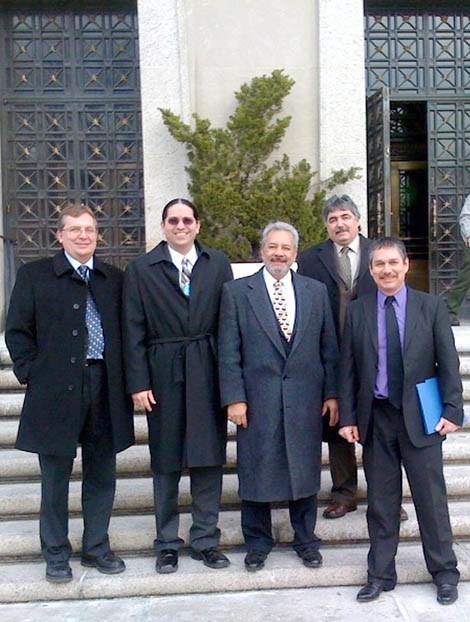NEWS RELEASE
SAULT TRIBE OF CHIPPEWA INDIANS
***************************** Tribal leaders provide united voice in nation’s capitol
SAULT STE. MARIE, MI - Since time immemorial, the Anishinaabeg have hunted, fished and gathered in the upper Great Lakes to survive and preserve their way of life.
While much has happened in the intervening centuries, the Anishinaabeg have always reserved those rights.
On February 5, for the first time in these modern days, all five of the 1836 Treaty tribes’ leaders traveled to the nation’s capitol to personally deliver their 2011 appropriations request for federal funding.
United by the regulatory body for 1836 Treaty Great Lakes fishing activities, Chippewa Ottawa Resource Authority, Sault Ste. Marie Tribe of Chippewa Indians Chairman Darwin “Joe” McCoy, Bay Mills Indian Community Chairman Jeffrey Parker, Little Traverse Bay Bands of Odawa Indians Chairman Kenneth Harrington, Grand Traverse Band of Chippewa and Ottawa Indians Chairman Derek Bailey and Little River Band of Ottawa Indians Chairman Larry Romanelli met with Department of the Interior officials to request base funding for the tribes’ inland activities as well as restored funding for Great Lakes fishing activities.
The historic meetings gave CORA tribes a voice in Washington, D.C. During this time when 2011 appropriations are being formulated, tribal leadership felt the lobbying effort was crucial.
“Congress and the Department of the Interior needed to understand why this new funding is so badly needed,” said Chairman McCoy. “Our new responsibilities under the 2007 Inland Consent Decree require significant and annual funding for the decree to be a success by ensuring sustainable fishing, hunting and gathering for our members on over 13.8 million acres in northern Michigan.”
The tribal leaders visited Department of the Interior Policy Analyst Tracey Stevens, Office of Budget Management Director Mary Jane Miller, Natural Resources Division Chief Ira NewBreast and Senior Specialist Forester John Vitello, assisted by Bryan Newland, special assistant to the assistant secretary for Indian affairs.
The chairs explained the history of the 1836 Treaty and resulting agreements, including the 2000 Consent Decree to regulate Great Lakes treaty fishing, and the 2007 Inland Decree to regulate the tribe’s inland hunting, fishing and gathering activities.
The historic 2007 agreement between the tribes and the state of Michigan requires a great deal of tribes’ resources for management and regulation of the tribes’ hunting, fishing and gathering activities in the 1836 Treaty ceded territory.
“Establishing base funding is our goal,” said CORA Executive Director Jane TenEyck, who felt that the meetings were positive and the information well received, although it’s too early in the appropriations process to tell if they were successful.
These court-ordered activities and responsibilities will cost the tribes $5.65 million annually to support the Inland Decree for biological services, conservation enforcement, administration, tribal court, and CORA support.
The tribes are looking for this base funding beginning with the 2011 budget.
Biological services alone will cost over $3.3 million.
The tribes are responsible for monitoring harvest of fish and wildlife and evaluating their status, developing population models to ensure the proper harvest levels and developing infrastructure to manage these species.
Conservation Enforcement to oversee inland activities throughout northern Michigan will cost $1.6 million.
The shared responsibility between the state and the tribes requires the tribes to develop and maintain a properly staffed, trained and equipped enforcement program.
Administration will require $.46 million to cover costs of issuing and managing permits and licenses for inland hunting, fishing and gathering, along with developing and maintaining a harvest database.
Tribal court will cost an estimated $.13 million.
As implementation of the inland consent decree progresses, the number of tribal members exercising their rights to fish, hunt and gather will increase, and tribal court activity is expected to increase as well.
CORA Administration support will cost $.15 million for additional inland issues.
CORA’s role calls for coordinating between its member tribes, as well as the state and local governments, in regards to issues related to implementation of the Inland Decree, as well as other intertribal functions.
CORA also requested recurring funds to meet the increased obligations mandated by the 2000 Consent Decree, an allocation agreement regulating the tribe’s Great Lakes fishing.
***************************** PHOTO CAPTION - (left to right) - Bay Mills Indian Community Chairman Jeffrey Parker, Grand Traverse Band of Chippewa and Ottawa Indians Chairman Derek Bailey, Little River Band of Ottawa Indians Chairman Larry Romanelli, Sault Ste. Marie Tribe of Chippewa Indians Chairman Darwin “Joe” McCoy and Little Traverse Bay Bands of Odawa Indians Chairman Kenneth Harrington.
Leaders of all 1836 treaty tribes, traveled to Washington, D.C., Feb. 5 to give a combined voice to the tribes’ 2011 approprtions request for inland base funding.
(Photo used courtesy of CORA.)
